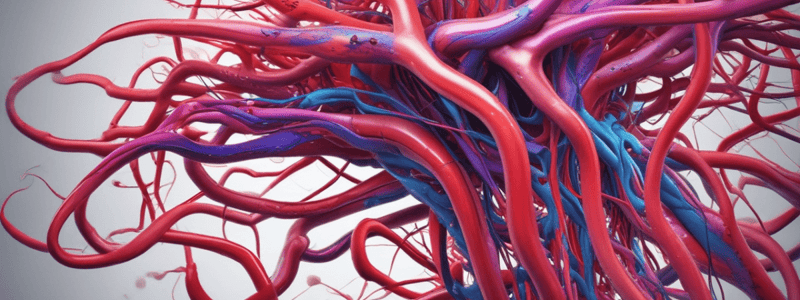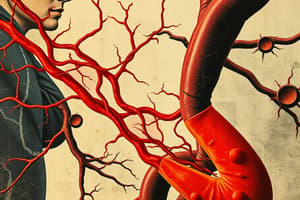Podcast
Questions and Answers
Blood flow through blood vessels follows the physical laws describing the flow of any ______ through any system of pipes.
Blood flow through blood vessels follows the physical laws describing the flow of any ______ through any system of pipes.
liquid
The flow rate of a liquid through the pipes is directly proportional to the difference between the pressures of the two ends of the pipe and inversely proportional to the ______ of the pipe.
The flow rate of a liquid through the pipes is directly proportional to the difference between the pressures of the two ends of the pipe and inversely proportional to the ______ of the pipe.
resistance
Blood flow is higher when the pressure difference between the two ends of the tube is higher and when the resistance to blood flow is ______.
Blood flow is higher when the pressure difference between the two ends of the tube is higher and when the resistance to blood flow is ______.
lower
The body has a mechanism to redirect blood from tissues that do not require much blood to tissues that need a lot of ______.
The body has a mechanism to redirect blood from tissues that do not require much blood to tissues that need a lot of ______.
Without a constant supply of oxygen, you will ______.
Without a constant supply of oxygen, you will ______.
In a person who is standing up, the heart has to pump blood against ______ to get it to the brain.
In a person who is standing up, the heart has to pump blood against ______ to get it to the brain.
Flow = (P1 – P2)/______ = size of the pressure gradient divided by the resistance.
Flow = (P1 – P2)/______ = size of the pressure gradient divided by the resistance.
The body can increase blood flow by ______ the pressure gradient.
The body can increase blood flow by ______ the pressure gradient.
The body can decrease blood flow by ______ the resistance.
The body can decrease blood flow by ______ the resistance.
______ flow is a term that refers to the movement of any substance down its pressure gradient.
______ flow is a term that refers to the movement of any substance down its pressure gradient.
Mean arterial pressure is greatest in the ______.
Mean arterial pressure is greatest in the ______.
Mean arterial pressure is lowest in the ______ as it returns to the heart.
Mean arterial pressure is lowest in the ______ as it returns to the heart.
Blood flow increases when mean arterial pressure ______
Blood flow increases when mean arterial pressure ______
The pressure gradient is higher in the ______ circuit than in the pulmonary circuit
The pressure gradient is higher in the ______ circuit than in the pulmonary circuit
The most significant drop in blood pressure occurs at the level of the ______
The most significant drop in blood pressure occurs at the level of the ______
Capillaries consist of a single layer of simple squamous epithelium and a small amount of ______
Capillaries consist of a single layer of simple squamous epithelium and a small amount of ______
If the pressure of blood flowing through the capillaries was too high, the capillary walls would ______
If the pressure of blood flowing through the capillaries was too high, the capillary walls would ______
Flow = (P1 – P2)/Resistance = The ______/Resistance
Flow = (P1 – P2)/Resistance = The ______/Resistance



